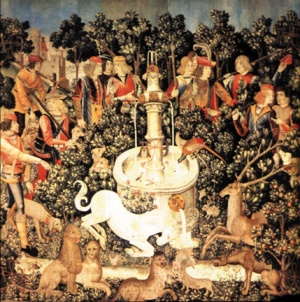Tapestry: Difference between revisions
(links, spelling) |
m (Reverted edits by Valera (Talk); changed back to last version by KarenLarsdatter) |
||
| (2 intermediate revisions by 2 users not shown) | |||
| Line 5: | Line 5: | ||
In [[period]], many tapestry designs were drawn up by [[artist]]s (mainly [[painter]]s) of the time and then executed by the tapestry weavers. |
In [[period]], many tapestry designs were drawn up by [[artist]]s (mainly [[painter]]s) of the time and then executed by the tapestry weavers. |
||
== External Links == |
|||
* [http://moas.atlantia.sca.org/wsnlinks/index.php?action=displaycat&catid=635 Atlantian A&S Links: Tapestry] |
|||
[[category:arts]][[category:weaving]] |
[[category:arts]][[category:weaving]] |
||
Latest revision as of 13:28, 21 October 2010
A tapestry is a woven rug-like item used to adorn walls. Tapestries can range greatly in size and complexity. Traveling nobility often carried tapestries with them from place to place since they were an easily transportable way to quickly and dramatically alter the look and feel of an entire room.
The tradition of tapestry weaving is said to have originated from humble and practical beginnings: the need to keep an interior space warm during the winters. Hanging rugs or wall coverings acted as removable insulation to protect inhabitants of a home from the cold stone or brick walls. In the warm months, the wall hangings could be removed. A once practical art evolved into the luxurious art of tapestry weaving.
In period, many tapestry designs were drawn up by artists (mainly painters) of the time and then executed by the tapestry weavers.
